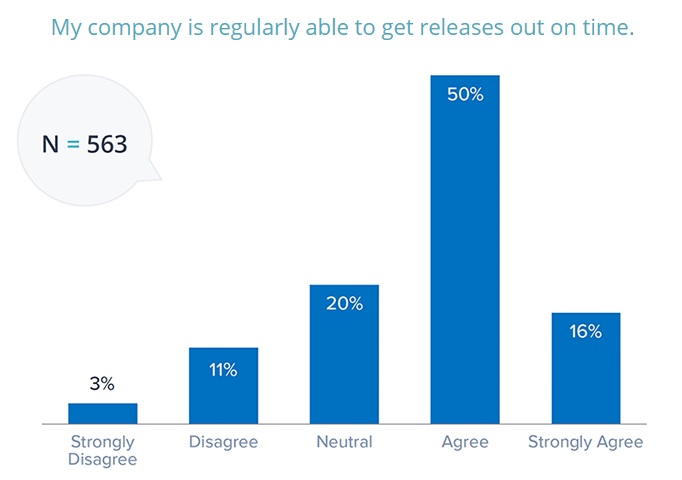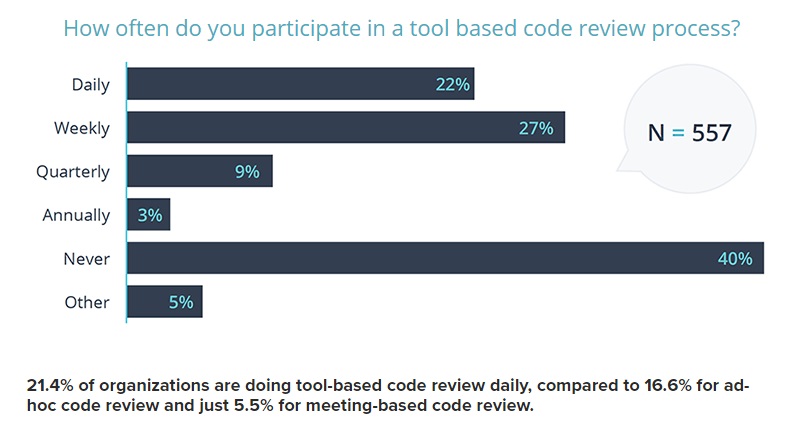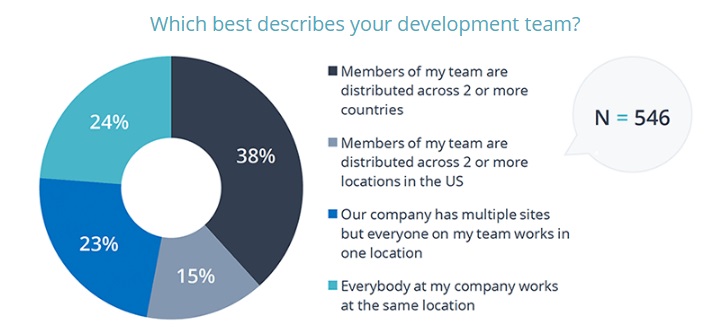SmartBear announced a new version of its API design and documentation tool, SwaggerHub, integrating Stoplight’s API open source tools.
Recently, the results from SmartBear Software's annual survey, the State of Code Review 2017: Trends & Insights into Dev Collaboration were released. The survey is divided into five sections that include Code Quality, Approaches to Code Review, Code Review & Doc Review Tools, Software Tools & Integrations and Software Teams. Each section reveals how teams and organizations are handling each one of those topics. What's fascinating about the survey is the amount of data captured. Here are some particularly interesting findings and comments.

Code Quality
There is a lot of data in the survey but one point I found interesting is that it suggests only 66 percent of organizations can get releases out on time. Why are the other 34 percent struggling to get releases out the door? I believe there are a number of factors that are preventing timely releases, many of them coming back to requirements and the ability to properly scope the release based on those requirements (or lack thereof).
Collaborating on and reviewing design documents and requirements are critical to a successful release. Many organizations find themselves struggling to collaborate effectively. In fact, I've heard horror stories of documents that are being passed around from desk to desk and then turn up missing.
There is no better way to slow down the development lifecycle than to start from scratch! This is one reason that document review tools exist. They keep things from getting lost.

Approaches to Code Review
There are a lot of different ways to do code review and ensure its effectiveness. I believe tool based review is on the rise because of the growing popularity of repository management tools like GitHub, Bitbucket and GitLab. What I found fascinating from this year's survey is that individuals using tools for code review perform reviews more frequently.
Honestly, I envisioned ad-hoc reviews would have been taking place more often than tool based reviews. People are sitting next to each other and it is easy to grab someone and have them take a quick look at something. However, teams are finding that a tool helps ensure that a process is being followed, which leads to reviews taking place more often.
And as can be seen in the survey, people aren't just reviewing in tools to improve code quality, they are seeing other big benefits as well. This includes mentoring, knowledge sharing and complying with regulatory standards.

Software Teams
The data from this section indicates that a lot of teams are distributed. Collaboration is not just occurring with the person sitting next to you or down the hall. Over half of the individuals surveyed have team members throughout the U.S. or the world. This makes communication vital.
It is never argued that successful software development takes collaboration! With so many teams separated by geography, it is a wonder that two thirds of them are getting releases out on time. I would hazard to guess that they take communication seriously and they are probably using tools to help them. Passing emails around with documents and source code is a terribly inefficient way to collaborate.
If your team is still performing reviews this way, I encourage you to find a tool. It saves a ton of time and dramatically improves the ability to communicate quickly and effectively with multiple people at once.

Final Thoughts
It is clear from the survey results that the majority of respondents feel their teams are productive and collaborating pretty consistently. The tools they are using line up with the conversations that I have on a weekly basis and were not surprising to me. I know that one area I'm hearing more and more about is the need to review documents. I would like next year's survey to dig a bit deeper in that area. What area would you like to see more data on?
Industry News
Red Hat announced updates to Red Hat Trusted Software Supply Chain.
Tricentis announced the latest update to the company’s AI offerings with the launch of Tricentis Copilot, a suite of solutions leveraging generative AI to enhance productivity throughout the entire testing lifecycle.
CIQ launched fully supported, upstream stable kernels for Rocky Linux via the CIQ Enterprise Linux Platform, providing enhanced performance, hardware compatibility and security.
Redgate launched an enterprise version of its database monitoring tool, providing a range of new features to address the challenges of scale and complexity faced by larger organizations.
Snyk announced the expansion of its current partnership with Google Cloud to advance secure code generated by Google Cloud’s generative-AI-powered collaborator service, Gemini Code Assist.
Kong announced the commercial availability of Kong Konnect Dedicated Cloud Gateways on Amazon Web Services (AWS).
Pegasystems announced the general availability of Pega Infinity ’24.1™.
Sylabs announces the launch of a new certification focusing on the Singularity container platform.
OpenText™ announced Cloud Editions (CE) 24.2, including OpenText DevOps Cloud and OpenText™ DevOps Aviator.
Postman announced its acquisition of Orbit, the community growth platform for developer companies.
Check Point® Software Technologies Ltd. announced new email security features that enhance its Check Point Harmony Email & Collaboration portfolio: Patented unified quarantine, DMARC monitoring, archiving, and Smart Banners.
Automation Anywhere announced an expanded partnership with Google Cloud to leverage the combined power of generative AI and its own specialized, generative AI automation models to give companies a powerful solution to optimize and transform their business.
Jetic announced the release of Jetlets, a low-code and no-code block template, that allows users to easily build any technically advanced integration use case, typically not covered by alternative integration platforms.
Progress announced new powerful capabilities and enhancements in the latest release of Progress® Sitefinity®.




